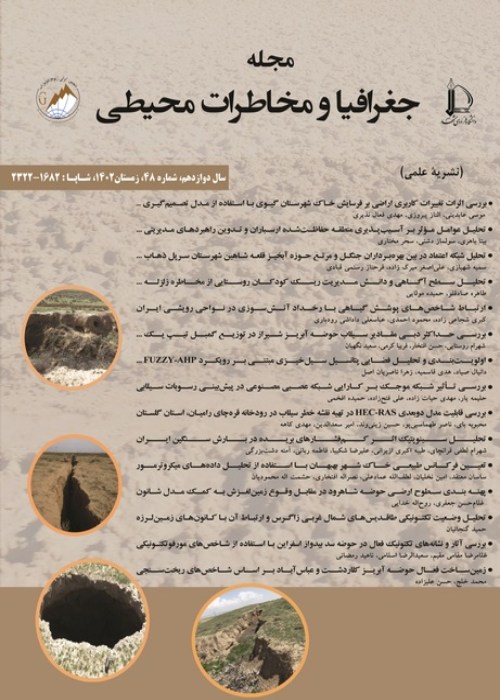The Relationship between Knowledge Management Related to Earthquake and Resilience (Case study: Trained Volunteers of Sarasiab Neighborhood in Kerman)
Author(s):
Abstract:
Introduction
Natural disasters are major challenges to achieve sustainable development of human communities. Earthquakes are a devastating, yet common natural disaster, that cause billions of dollars in property damage and the loss of human life. Pre-disaster prevention and post-disaster reconstruction can significantly reduce the impact of earthquakes on communities.
The resiliency of local communities was introduced as a comprehensive approach to reduce the consequences of earthquake, in the International conference of Hyogo in the Japan. The goal of this approach is to reduce the vulnerability of communities and strengthen people to cope with the risks of natural disasters. Knowledge management can play an important role in ensuring the reliability and availability of reliable information to increase resiliency among local communities. In this study trained volunteers of Sarasiab Neighborhood in Kerman have been investigated.
Materials and methods
The purpose of this study is to investigate the relationship between knowledge management related to earthquake and resilience. The research is practical in terms of purpose and descriptive correlation in terms of the research method. The statistical population included all 140 trained volunteers in Sarasiab neighborhood in Kerman. The sample is 103 individuals who were selected by simple random sampling.
In order to collect data, we used two questionnaires; knowledge management related to earthquakes (including four dimensions: Knowledge acquisition, knowledge storage, knowledge sharing, and knowledge utilization) and Resilience questionnaire (including two dimensions, namely, social and economic resilience). Their validity was confirmed by professors and experts and the questions’ reliability was confirmed using Cronbach's alpha. SPSS 21 software was used for data analysis. For testing hypotheses one-sample t-test, two-sample t-test, ANOVA, and Pearson correlation coefficient were used.
Result and Discussion
The results showed that there is a significant positive correlation between knowledge management related to the earthquake and resiliency of trained volunteers in the Sarasiab neighborhood. Moreover, all sub-hypotheses were confirmed, too. On the other hand, the results of pairwise comparison of the means showed that there is no significant difference between males and females in terms of knowledge management, but in terms of knowledge management, there are differences between the experienced and inexperienced groups, and between groups with different levels of education and ages. The means of resilience are different among all the groups.
Conclusion
The results of this study is in harmony with the results of Goodwin and Partners (2013). The results showed that promoting the level of knowledge is essential to increase resilience against earthquakes and to reduce the impact of earthquakes on communities. Therefore, it is necessary for all organizations to be involved in the management of crisis in order to reduce the consequences of earthquake, and increase the knowledge and awareness of local communities to enhance earthquake resilience.Keywords:
Language:
Persian
Published:
Journal of Geography and Environmental Hazards, Volume:7 Issue: 27, 2018
Pages:
75 to 87
magiran.com/p1941310
دانلود و مطالعه متن این مقاله با یکی از روشهای زیر امکان پذیر است:
اشتراک شخصی
با عضویت و پرداخت آنلاین حق اشتراک یکساله به مبلغ 1,390,000ريال میتوانید 70 عنوان مطلب دانلود کنید!
اشتراک سازمانی
به کتابخانه دانشگاه یا محل کار خود پیشنهاد کنید تا اشتراک سازمانی این پایگاه را برای دسترسی نامحدود همه کاربران به متن مطالب تهیه نمایند!
توجه!
- حق عضویت دریافتی صرف حمایت از نشریات عضو و نگهداری، تکمیل و توسعه مگیران میشود.
- پرداخت حق اشتراک و دانلود مقالات اجازه بازنشر آن در سایر رسانههای چاپی و دیجیتال را به کاربر نمیدهد.
In order to view content subscription is required
Personal subscription
Subscribe magiran.com for 70 € euros via PayPal and download 70 articles during a year.
Organization subscription
Please contact us to subscribe your university or library for unlimited access!



